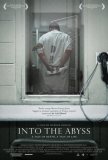Into the Abyss (Germany/Canada, 2011)
November 15, 2011
Watching Into the Abyss, I had the overwhelming sense that, somewhere along the way, Werner Herzog lost his way. It happens to the best filmmakers, and that's one of the perils of making a documentary - events don't always go where the man behind the camera thinks they will. In this case, Herzog salvages the movie with several remarkable interviews, but a lot of what appears on the screen during the course of Into the Abyss is pedestrian - the kind of "frank and open" discussion one can find in any TV "mystery newsmagazine" show (and there are a lot of those - 20/20, Dateline, 48 Hours Mystery). We think of Herzog as being better than that, but it's not always apparent here.
The lynchpin of Into the Abyss is a triple homicide that took place in 2001 in Conroe, Texas. Two men, Jason Burkett and Michael Perry, were tried and convicted for the killings. Burkett received a life sentence (eligible for parole after 40 years); Perry was executed on July 1, 2010. Herzog was able to conduct interviews with both men - In Perry's case, this occurred eight days before his execution and represents one of the most intriguing (albeit brief) instances of communication from a man near the end of his stay on Death Row. Some of the interviews are more compelling than others, but Herzog's overall message is muddled and his anti-death penalty interjections (he is heard but not seen) leave little doubt where he stands on the matter.
There doesn't seem to be much doubt that Burkett and Perry were guilty. Herzog spends the first 20 minutes of Into the Abyss detailing the case with the help of archived footage photographed at the crime scenes and an interview with a police investigator. Strangely, although both Burkett and Perry proclaim their innocence, Herzog never presents "their" side of the story. Presumably, they blame the killings on each other, but we never hear anything specific from them except that they didn't do it, nor is it explained why Perry died for the crime while Burkett continues to live. If any of this came out during the trial, Herzog does not detail it.
The pre-execution interview with Perry is a coup, although it provides little insight into the psyche of a murderer. He appears at peace with his fate and is surprisingly calm considering his supposed innocence. He is aware the chance for a last-minute reprieve is small - this is Texas, where Death Row inmates are actually executed - and he does not seem optimistic about the possibility of clemency. Perry is largely a blank slate, although it is admittedly difficult to reconcile the boyish-looking convict with the man who killed three people in cold blood.
Many of the other interviews are unremarkable. Burkett doesn't say much of interest; he maintains his innocence but acknowledges being involved in the crimes. Herzog spends an inordinate amount of time talking to Burkett's father (also in prison, albeit for a different crime), Delbert, who carries a burden of guilt for being a poor parent. The interview with the daughter of the first victim is poignant but not much different from the kind of heart-wrenching recollections we encounter with regularity on TV news magazines. Burkett's wife, Melyssa, is a potentially interesting character - she's one of those women who marries a man behind bars - but Herzog reveals this late in the movie and glosses over the relationship, leaving open the question of how she became pregnant when she has never had intimate contact with her husband. (The implication is that a vial of his sperm was smuggled out of prison and used to inseminate her.)
Perhaps the most compelling segment of Into the Abyss is Herzog's discussion with Fred Allen, a corrections officer who supervised more than 120 of Texas' executions, mostly during the '80s and '90s. After quitting his job (and foregoing his pension in the process), he became an outspoken death penalty opponent. Here, he details the procedure of how the prisoners spend their last hours and what they experience when they are strapped down to await their lethal injection. This is Herzog's anti-death penalty ace in the hole, and the director plays it perfectly.
The problem with Into the Abyss has nothing to do with its politics but that it's a scattershot production unsure of what it wants to accomplish. It's a random series of snapshots of individuals entwined by tragedy - the killers, friends and families of the killers, and loved ones of the victims - yet the connective tissue is poorly knit. This is not trying to be Paradise Lost or The Thin Blue Line. Instead, it strives to be a simpler, more human film with less grandiose ambitions. As a Discovery Channel program (the network provided much of the funding) seen on TV, Into the Abyss would be a passable diversion, but it lacks the scope and impact one rightly expects from a cinematic documentary. For a documentarian of Herzog's stature, Into the Abyss ranks as a disappointment.
Into the Abyss (Germany/Canada, 2011)
Cast: Jason Burkett, Michael Perry, Fred Allen
Screenplay: Werner Herzog
Cinematography: Peter Zeitlinger
Music:
U.S. Distributor: Sundance Selects
U.S. Release Date: 2011-11-11
MPAA Rating: "PG-13" (Profanity, Violence)
Genre: DOCUMENTARY
Subtitles: none
Theatrical Aspect Ratio: 1.85:1
- (There are no more better movies of Jason Burkett)
- (There are no more worst movies of Jason Burkett)
- (There are no more better movies of Michael Perry)
- (There are no more worst movies of Michael Perry)
- (There are no more better movies of Fred Allen)
- (There are no more worst movies of Fred Allen)
Comments